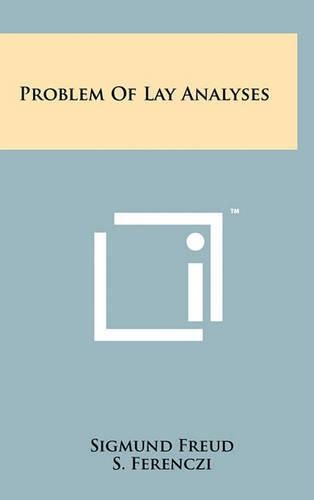Readings Newsletter
Become a Readings Member to make your shopping experience even easier.
Sign in or sign up for free!
You’re not far away from qualifying for FREE standard shipping within Australia
You’ve qualified for FREE standard shipping within Australia
The cart is loading…






2010 Reprint of 1927 First American Edition. Lay analysis is psychoanalytic treatment carried out by someone who is not a physician. The term was first used by Freud in The Question of Lay Analysis, where he vigorously asserted that in the practice of psychoanalytic treatment, what mattered was good training, independent of diplomas obtained beforehand. The issue of lay analysis was raised early in the history of the psychoanalytic movement. Freud took the position that training, not diplomas, was the key issue. On the level of theoretical justifications, two conceptions of psychoanalysis were opposed here. For some, psychoanalysis is a therapy that seeks to care for, and if possible cure, mental problems, even minor ones. Thus it can only be legitimately practiced by a doctor, preferably a psychiatrist, who has the necessary training to give a diagnosis and referral for analysis, and then to treat the patient with the broad-mindedness and accountability that doctors have. For others, however, analytic treatment is above all a personal experience, a liberation from the conflicts that restrict the ego and burden the mind, emotional life, and relations with others. Freedom and personal enrichment are the major aims, and any shortsighted preoccupation with a cure risks becoming an obstacle to good psychoanalysis. One could even argue that psychiatric training, which predisposes the physician toward diagnosis and treatment, is a handicap for the psychoanalyst. In psychoanalysis, the crucial references are cultural, even philosophical.
$9.00 standard shipping within Australia
FREE standard shipping within Australia for orders over $100.00
Express & International shipping calculated at checkout
2010 Reprint of 1927 First American Edition. Lay analysis is psychoanalytic treatment carried out by someone who is not a physician. The term was first used by Freud in The Question of Lay Analysis, where he vigorously asserted that in the practice of psychoanalytic treatment, what mattered was good training, independent of diplomas obtained beforehand. The issue of lay analysis was raised early in the history of the psychoanalytic movement. Freud took the position that training, not diplomas, was the key issue. On the level of theoretical justifications, two conceptions of psychoanalysis were opposed here. For some, psychoanalysis is a therapy that seeks to care for, and if possible cure, mental problems, even minor ones. Thus it can only be legitimately practiced by a doctor, preferably a psychiatrist, who has the necessary training to give a diagnosis and referral for analysis, and then to treat the patient with the broad-mindedness and accountability that doctors have. For others, however, analytic treatment is above all a personal experience, a liberation from the conflicts that restrict the ego and burden the mind, emotional life, and relations with others. Freedom and personal enrichment are the major aims, and any shortsighted preoccupation with a cure risks becoming an obstacle to good psychoanalysis. One could even argue that psychiatric training, which predisposes the physician toward diagnosis and treatment, is a handicap for the psychoanalyst. In psychoanalysis, the crucial references are cultural, even philosophical.